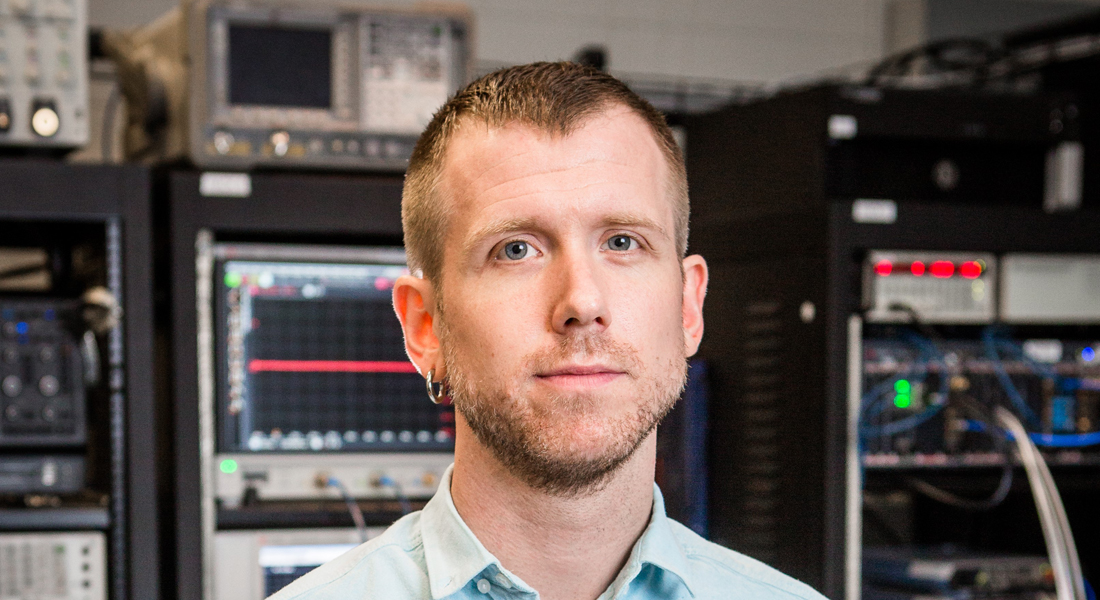Morten Kjærgaard admitted to the Danish Young Academy
Morten Kjærgaard, assistant professor at Niels Bohr Institute, University of Copenhagen, has been admitted to the Danish Young academy (DUA). The Danish Young Academy is the 'Junior Edition' of Royal Danish Society of Sciences and Letters, but this does not make it less exclusive. Very few young researchers are admitted every year, and Morten Kjærgaard is the only physicist this year.

Quantum physics, Bohr, Einstein and the way ahead
Morten Kjærgaard's field is quantum physics, so in this respect he follows in the department's footsteps. The discussions between Einstein and Bohr, where Bohr's interpretations of what is going on at the tiniest scales ended up becoming the dominant, is the backdrop for what Morten and the department are facing today. The world is on the verge of a quantum revolution, and Morten explains his work: "My research is roughly about building quantum computers and understanding their behaviour. Algorithms that exploit the laws of quantum physics can solve certain calculations in a fraction of the time it would take the world's largest supercomputers. Quantum computers can be built by replacing the central component of our computers (known as 'bits') with quantum physical particles (called 'quantum bits'). There are many suggestions for which quantum physical particles are best suited to produce such quantum bits, and my research is in particular about a type called 'superconductive quantum bits'.
The core of the quantum revolution is the speed and type of calculations
Quantum computers can solve problems that conventional computers can’t. The potential is huge, and it gives an idea of the ability of the new technology that an experiment with 53 superconducting quantum bits has already demonstrated ability to perform a calculation 10,000 times faster than even the biggest conventional supercomputers today. However, there is still some way to go before the quantum computer is a functional reality: "It is demonstrated that quantum computers can do stuff that classic supercomputers can’t. The question is: Does this mean we’ve found the best form of 'artificial atom', or should we continue to develop new quantum bits? Or should we just find 'the right programme' and then quantum computers can outperform classic computers in something useful? But even if you have a quantum computer that performs a very sophisticated calculation, how do we verify that calculation using classic computers? To answer these questions, we need to use techniques from materials science, computer theory, quantum physics, low-temperature measurement techniques and experimental know-how (to name a couple of fields). The connection between these various areas is a challenge in itself, but the field is well on the way trying to solve the problem, and it is unique to be part of it."
Morten continues: "It is expected that quantum computers will be able to contribute to solving some of the most complex problems the world is facing: Development of new types of medicine, climate change and secure communication, as well as optimization and simulations of physical systems."
Why membership of the Young Academy, Interdisciplinarity and education are associated
"I believe curiosity and an open mind are key elements in both education and training. Research can easily get very focused on its own small corners of the world, and it is easy to lose sight of the broad joy of learning about and understanding the world in everyday life. DUA is a unique opportunity to interact regularly with other research fields and expand the horizon: Regardless of whether it is 'useful' or not, I think it is an absolute necessity to promote understanding and maintain curiosity. In addition, I also hope that I will be able to contribute to having broad, general learning get back into focus: Because of grades, admission requirements and the like, teaching and learning can be very focused on results, and I think it can sometimes be in contrast to letting curiosity and interest drive (some of) the work!
